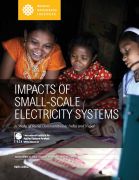Impacts of small-scale electricity systems: a study of rural communities in India and Nepal
Impacts of small-scale electricity systems: a study of rural communities in India and Nepal

This study assesses and compares the benefits of electricity service to households and small enterprises from microgrids, solar home systems (SHS), and the national grid in select rural communities in India and Nepal. Electricity access, in general, leads to reduced kerosene use, more time spent by women on income-generation, and the acquisition of home appliances. However, different types of systems have distinct differences in electricity service conditions. These conditions partly explain why households with SHS exhibit the greatest reduction in kerosene use; why grid-connected households own more appliances; and why electricity access benefits small businesses, but seldom drives key business decisions. The developmental impacts of rural electricity access may benefit from supply standards, greater policy support for investments in productive uses, and further research into the cost-effectiveness of electrification from different supply systems.







